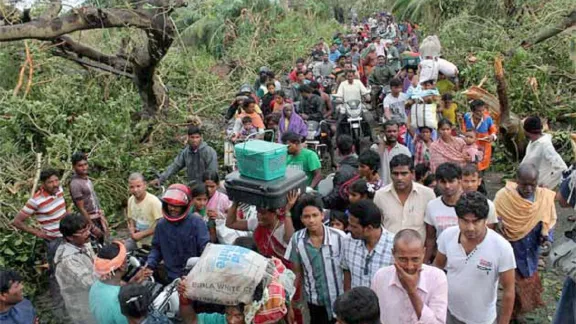
Villagers returning to their homes after Cyclone Phailin. Photo: LWSIT
Lutheran World Service India Trust Thanks Volunteers
(LWI) – Lutheran World Service India Trust (LWSIT) says community-based volunteers trained in disaster preparedness in Odisha and Andhra Pradesh states significantly contributed to minimizing the risks from the cyclone that struck India’s coastal region on 12 October.
Cyclone Phailin, the severest storm to strike India’s eastern coastline in 14 years, left 28 people dead in the two states, flattened hundreds of thousands of homes, destroyed paddy crops worth USD 400 million and killed thousands of animals. It disrupted the lives of nearly 14 million people in the disaster-prone region.
LWSIT, an associate program of The Lutheran World Federation (LWF) Department for World Service, has been working with about 2,000 communities on disaster preparedness and risk reduction programs following the devastating 1999 cyclone that killed 10,000 people in Orissa.
In October community teams trained by LWSIT in early warning signs including information dissemination, evacuation and search skills and management of shelters joined local authorities in evacuating nearly 900,000 people to cyclone shelters and schools in Orissa, avoiding a repeat of previous disasters.
State and non-governmental organization spokespersons described the preparedness training and evacuation efforts by groups such as LWSIT as the biggest in India’s history.
“During Cyclone Phailin the real heroes were the trained community volunteers and animators who helped in the evacuation and managed the residents at the shelters safely,” said Dr James Vijayakumar, LWSIT director. “These communities were equipped with much needed food and drinking water locally during the cyclone.”
In the initial training phases, “there were challenges in motivating people to think more proactively towards preparedness than material assistance,” Vijayakumar said.
“But, once they were convinced and got motivated it had a triggering effect and neighboring communities came forward and invited LWSIT to teach such lessons on disaster preparedness,” he noted.
LWSIT’s slogan “Either Prepare or Perish,” was translated into vernacular language and struck a chord with those who encountered it, the LWSIT director emphasized.
“People really got serious and did their best and because of this the loss of life has been minimal. Nevertheless it was not possible to save standing crops and trees from the fury of nature since the intensity of the cyclone was so strong,” Vijayakumar added.
(Lutheran World Service India Trust Kolkata office contributed to this article.)


